
Giosuè Alessandro Giuseppe Carducci was an Italian poet, writer, literary critic and teacher. He was noticeably influential, and was regarded as the official national poet of modern Italy. In 1906, he became the first Italian to receive the Nobel Prize in Literature. The Swedish Academy's motivation was that "not only in consideration of his deep learning and critical research, but above all as a tribute to the creative energy, freshness of style, and lyrical force which characterize his poetic masterpieces."
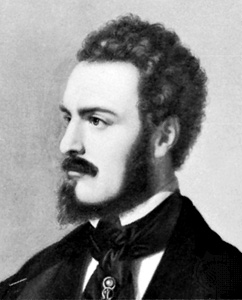
Giuseppe Giusti was an Italian poet and satirist.

Giovanni Battista Guarini was an Italian poet, dramatist, and diplomat.

Vincenzo da Filicaja was an italian poet and politician, citizen of Grand Duchy of Tuscany. His poetry was compared to that of Petrarch, and his association with the Accademia della Crusca gave him access to royal patronage. He served as governor of Volterra and Pisa, successively, and finally in the Tuscan Senate.

Daniello Bartoli, SJ was an Italian Jesuit writer and historiographer, celebrated by the poet Giacomo Leopardi as the "Dante of Italian prose"

Francesco Guicciardini was an Italian historian and statesman. A friend and critic of Niccolò Machiavelli, he is considered one of the major political writers of the Italian Renaissance. In his masterpiece, The History of Italy, Guicciardini paved the way for a new style in historiography with his use of government sources to support arguments and the realistic analysis of the people and events of his time.

Italian literature is written in the Italian language, particularly within Italy. It may also refer to literature written by Italians or in other languages spoken in Italy, often languages that are closely related to modern Italian, including regional varieties and vernacular dialects.

Benedetto Luti was an Italian painter, draftsman, and pastelist.
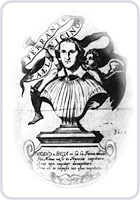
Ferrante Pallavicino was an Italian writer of numerous antisocial and obscene stories and novels with biblical and profane themes, lampoons and satires in Venice which, according to Edward Muir, "were so popular that booksellers and printers bought them from him at a premium." Pallavicino's scandalous satires, which cost him his head at the age of twenty-eight, were all published under pseudonyms or anonymously.

Francesco Maria Sforza Pallavicino or Pallavicini, was an Italian cardinal, philosopher, theologian, literary theorist, and church historian.
The Accademia degli Arcadi or Accademia dell'Arcadia, "Academy of Arcadia" or "Academy of the Arcadians", was an Italian literary academy founded in Rome in 1690. The full Italian official name was Pontificia Accademia degli Arcadi.
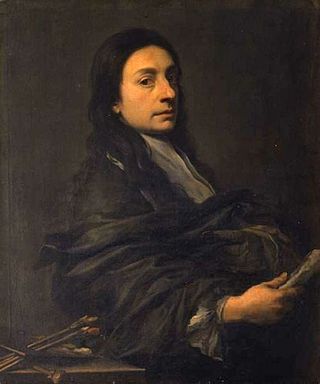
Anton Domenico Gabbiani was an Italian painter and active in a late Baroque style. He worked primarily in Florence for the Medici court.

Lionardo Salviati (1539–1589) was a leading Italian philologist of the sixteenth century. He came from an illustrious Florentine family closely linked with the Medici. Salviati became consul of the Florentine Academy in 1566, and played a key role in the founding of the Accademia della Crusca, with its project of creating a dictionary, which was completed after his death.
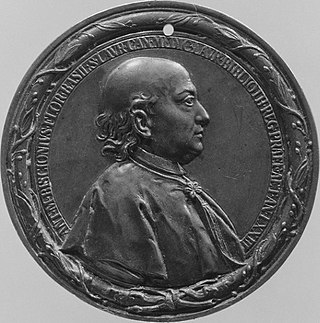
Antonio Maria Biscioni was an Italian historian, philologist, and librarian for the Laurentian library of Florence. He was born in Florence and entered religious orders. Among his pupils were Giovanni Gaetano Bottari. He wrote a history of Pistoia in the 14th-century: Historie pistolesi, ovvero delle cose avvenute in Toscana dall'anno 1300 al 1348. He catalogued the Hebrew and Greek biblical texts in the Laurenziana: Bibliothecae Ebraicae Graecae Florentinae, sive Bibliothecae Mediceo-Laurenzianae, Volume 1. He was a member of the Accademia della Crusca.
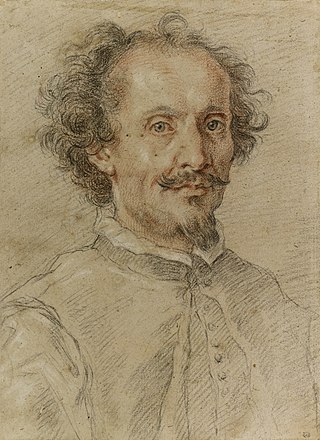
Agostino Mascardi was an Italian rhetorician, historian and poet.
Scipione Errico was an Italian poet, writer, literary critic and academic.

Giovan Francesco Maia Materdona was an Italian Baroque poet and Roman Catholic priest.
Giovanni Cinelli Calvoli was an Italian physician and bibliographer of the Seicento.

Lodovico Scapinelli was an Italian philologist and poet.

Lodovico Adimari was an Italian poet and playwright.

















